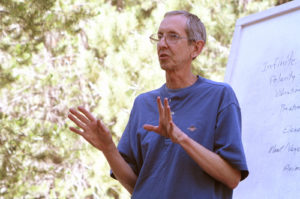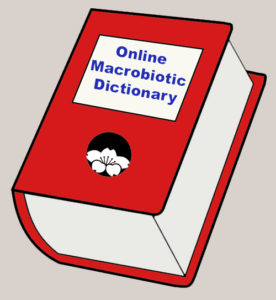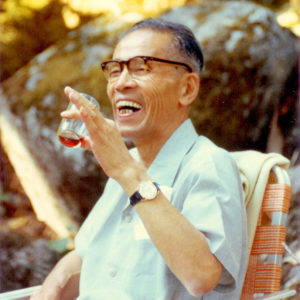
Completed Entries
Although Ohsawa used the words “accept” and “acceptance” to mean consent, agreement, or approval at times, he used them mostly in the sense of open-mindedness, impartiality, or receptiveness. He encouraged people to accept/receive difficulties and misfortunes with a joyful attitude because everything comes from the Infinite (Oneness) and because he believed as we wrote, “nothing unpleasant or sorrowful is needlessly produced.” Cancer and the Philosophy of the Far East, 56. Everything that happens is necessary and useful in that it can help one understand life from a larger (macro) perspective. The eternal order in life is that it oscillates between difficulty and pleasure—it is impossible to stay on one side or the other. Ohsawa teaches that the more grateful a person can be for all that happens in life, the happier he or she will be. “Accept everything with greatest pleasure and thanks. Accept misfortune like happiness, disease like health, war like peace, foe like friend, death like life, poverty like prosperity—and in case you do not like it or you cannot stand it, refer to your universal compass, the Unifying Principle; there you will find the best direction. Everything that happens to you is what you are lacking. All that is antagonistic and unbearable is complementary.” Philosophy of Oriental Medicine, 68.
The supposition that eating slightly more alkaline-forming foods than acid-forming foods each day is best for optimal health. This theory is based on the fact that blood pH needs to be maintained at 7.35 to 7.45 (slightly alkaline).
Foods that when digested cause the bodily fluids to become more acidic. Examples include animal foods, grains, beans, nuts, sugar, alcohol, most chemicals, and drugs.
The primary minerals that have an acid-forming effect are sulphur, phosphorus, chloride, fluoride, and iodine.
A preponderance of acid byproducts in the internal fluids, especially when in the blood.
Physical movement leads to internal heat and greater movement of oxygen throughout the body. Activity is essential to the process of biological transmutation, the body’s ability to change one element to another leading to a better usage of consumed nutrients. No inactivity is the fourth of four items of Ohsawa’s therapy. The other three are natural food, no medicine, and no surgery. Note: While these items are the goal, medicines and surgery are used (“accepted”) when needed.
Dressing (vegetables) with soybean paste, orange juice, etc.
In nature, that which adapts is that which survives. The ability to adapt is the cornerstone of health. Macrobiotic practice needs to change as the conditions around one change and as one’s condition changes.
Style of vegetable cooking with salt, boiling water, and heat. After vegetables are soft, sesame butter or another condiment is added.
Deep-fried tofu, often made in a bag-shaped pouch. Agé made from nigari tofu is preferred.
Asian root vegetable or tuber (colocasia esculenta), similar to a small potato, with a sticky interior. It is known in the U.S. by its Tahitian name taro, in Japan as satoimo, and in India as albi. It is usually grated for topical applications and is most often used as an external taro plaster.
See Taro plaster.
Foods that when digested cause the bodily fluids to become more alkaline. Examples include sea salt and salt products, vegetables, most fruits, seeds, nonchemicalized teas, and coffee (black, without cream or sugar).
The primary minerals that have an alkaline-forming effect are sodium, potassium, calcium, magnesium, and iron.
Liquid sweetener made from sweet rice fermented with koji enzyme; used to make desserts or as a beverage.
Amino acids are the building blocks of proteins and life, primarily helping the body build muscle and regulate immune function. Although there are twenty amino acids that are important for health, only nine or ten are termed “essential” because they cannot be made by the body and must be supplied by food or supplements. According to macrobiotic thinking, the ten essential amino acids are threonine, leucine, lysine, valine, tryptophan, isoleucine, methionine, histidine, phenylalanine, and tyrosine. All essential amino acids can be obtained from vegetal foods, especially soy products like miso and shoyu, quinoa, and sesame seeds, and when whole grains and beans are eaten in combination.
In macrobiotic practice, animal foods are eaten in smaller amounts than in a typical Western diet. Ohsawa taught ten healthful diets by percentage: five included animal foods (10 to 30%) and five were vegan—no animal foods whatsoever. Furthermore, the macrobiotic view is that animal foods are not essential for life and thus are to be used only for pleasure or as a temporary curative. If animal foods are eaten, people are advised to choose ones without chemical additives and to include a large amount of vegetables to help balance their effects. Herman Aihara writes: “Light, air, water, grains, land vegetables, sea vegetables, beans, nuts, fish, fruit, salt, and animal foods are available to us, in that approximate order; and that is the approximate order in which we must eat them if we want to be healthy.” Macrobiotics: An Invitation to Health to Happiness, 88.
Animal foods are high in four of the ten essential amino acids: threonine, leucine, lysine, and valine. Even though animal foods contain higher proportions of these amino acids, they are all available in vegetal foods. Good vegetal sources of essential amino acids are quinoa, sesame seeds, and soy products like miso and shoyu. All other vegetal foods are “incomplete” proteins. Eating whole grains and beans in combination increases the usability of essential amino acids because all of them are available at the same time, resulting in what is called a “complete” protein.
The beginning of animals, including humans, as the magnesium in chlorophyll is replaced by iron in the creation of hemoglobin—the essence of blood (red). Antagonisms and complementaries include white and red corpuscles, bone and flesh, man and woman, governors and governed, worker and capitalist, work and rest, love and hate, war and peace, sickness and health, and life and death. This is the seventh and final world of the Order of the Universe.
The desire and ability to eat the simplest food with joy, pleasure, and deep gratitude. Good appetite is one of the seven conditions of health.
Juice from grated apple massaged into the scalp to relieve headaches.
See Cautionary note.
Finely grated apple (peel included) spread on cheesecloth and applied to the head or other body part. An apple plaster is useful for headaches, including migraine headaches with no fever, and heart palpitations. Any apple variety may be used.
See Cautionary note.
The use of the juice from plant tissues or various foods applied directly to the skin for therapeutic reasons. See also compresses, packs, and plasters.
See Cautionary note.
Bancha tea leaves application: Bancha (or green) tea leaves mixed with saliva and applied to insect stings or bites.
Burdock seeds application: Seeds from the burdock plant mixed with saliva and used for skin infections such as boils.
Crab water application: Water from a freshly boiled crab used for poison oak or ivy rash.
Ginger sesame oil application: Grated ginger mixed with sesame oil used to cover insect bites.
Green leafy vegetables application: Chopped dark-green leafy vegetable used for arthritis pain and skin infections.
Green leaves application: Leaves of any green leafy vegetable or wild plant used most often in conjunction with a tofu plaster and directly on any area with persistent pain or swelling.
Lotus root juice application: Grated lotus root used to help clear nasal passages.
Mustard powder application: Mustard powder mixed with warm water and used for pain from dental caries.
Tofu application: Mashed tofu used for skin abscesses, pain from burns, and acne.
Appreciation goes hand-in-hand with acceptance. Gratitude is deep joy for all things we are given: from air, sunshine, and water to life itself. One expression of gratitude is in giving to others. Giving to others is a way to improve spiritual power. Giving up something, especially what one values most, to help others is a manifestation of love.
A sea vegetable similar in appearance to hijiki but more closely related to wakame and kombu. It is useful for treatment of the spleen, pancreas, female disorders, and high blood pressure.
Water from boiled arame used as a full bath mainly to help increase circulation and remove excess salt. Mustard powder or salt is sometimes added to further improve circulation. Grated ginger is added to help reduce fever.
See Cautionary note.
Hot arame water used as a compress for improving circulation or to relieve rheumatism pain.
See Cautionary note.
Boiled arame and salt water used as a hip bath for skin diseases, bladder or anal pain, or female disorders. Grated ginger or mustard powder is added for specific disorders.
See Cautionary note.
Ohsawa taught that arrogance (over-inflated feelings of superiority or self-importance) is the most fundamental and difficult of all maladies that must be cured first. An arrogant person knows no joy or gratitude and doesn’t mind other people’s problems as long as his or her needs are met. One aim of macrobiotic living is happiness that comes from the realization that everything and everyone emanates from one Infinite, absolute world. This understanding can help remedy arrogance.
The part of the nervous system that controls and regulates the internal organs and bodily functions such as breathing, heartbeat, and digestive processes without being consciously directed. The system contains two antagonistic (and complementary) sets of nerves.
See Stages of Sickness.
Japanese red bean believed to be one of the most “yang” beans. It is a good carbohydrate-source of phosphorus, potassium, iron, and calcium and an excellent protein complement to whole grains. In macrobiotic thinking, the azuki is considered to have excellent healing properties for the kidneys because of its diuretic quality.
Projected Entries
Abehsera, Michel
Absolute justice
Acupressure
Acupuncture
Adrenal glands
Agar-agar
AIDS
Aihara, Cornellia (Chiiko Yokota)
Aihara, Herman (Nobuo Nishiyama)
Aikido
Air sickness
Akizuki, Dr. Tatsuichiro
Alaria
Albumin
Alcoholic beverages
Alignment
Alkaline condition
Allergies
Amino acid utilization
Amino acids
Amoebic dysentery
Anemia (general weakness)
Anemia, pernicious
Anger
Angiosperms
Antihistamines
Antioxidants
Apoplexy
Appendicitis
Appetite
Apples
Arachidonic acid
Arepa
Aristotelian dichotomy (logic)
Armoise
Arrowroot flour
Arthritis
Ashburnham
Aspects of judgment
Aspirin
Asthma
Atheromas
Atherosclerosis
Atoms
Autonomic nervous system
Autotrophism
Ayurvedic medicine
Questions or Comments?




